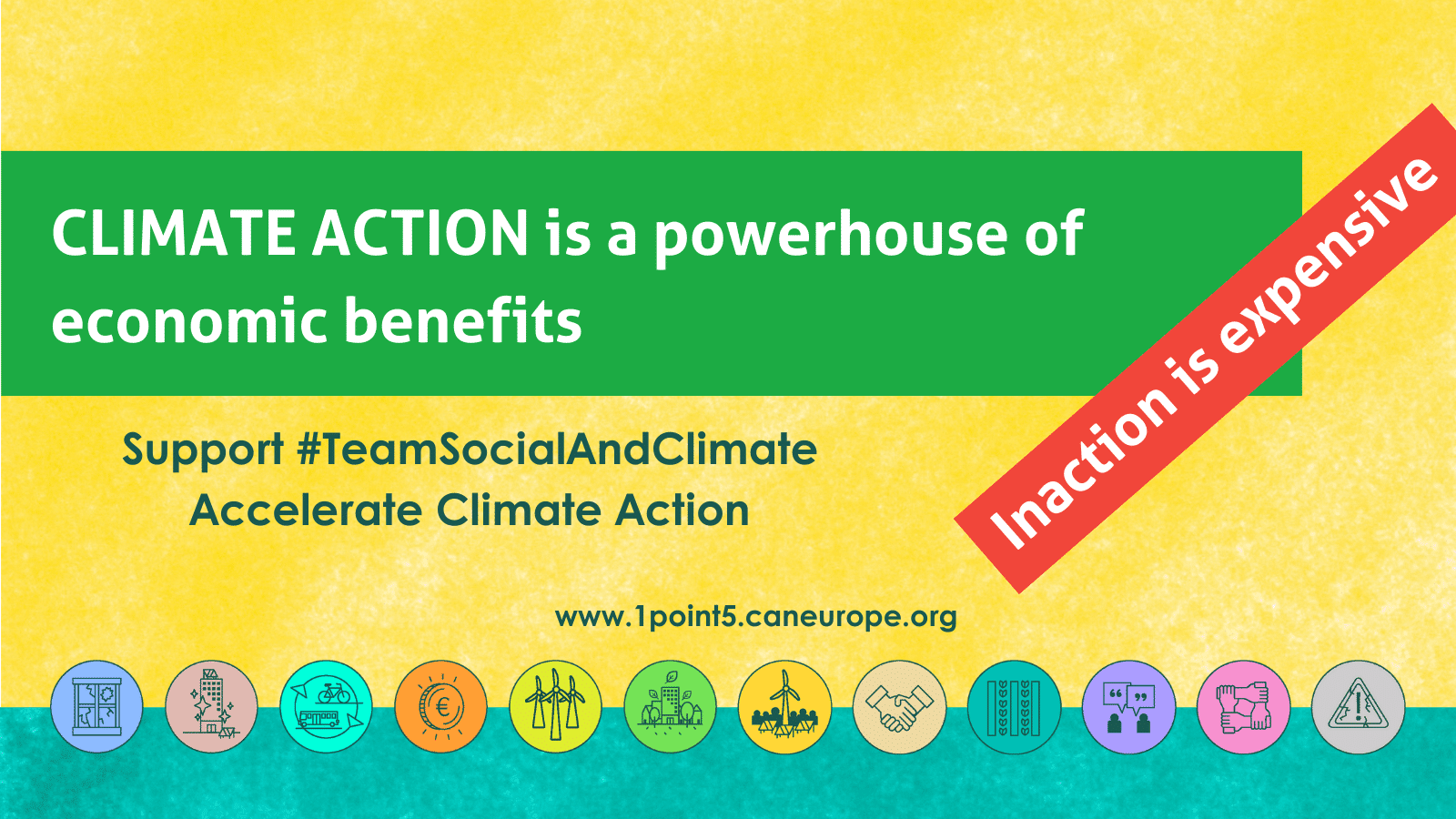While upcoming elections are in full swing, policymakers find themselves at a critical crossroad, wielding considerable influence in the finalisation of National Energy and Climate Plans (NECPs), and a consolidated 2040 EU climate target.
The new report by CAN Europe “Paris Pact Payoff: Speeding up the green transition for socio-economic co-benefits”, brings convincing arguments that climate action is not just necessary, but economically rational. Protecting people and the planet from the devastating impacts of dangerous climate change is a moral duty, as well as a pragmatic choice.
The EU and its Member States need to take decisive and bold climate action now. First, for a matter of justice. Both the United Nations Framework Convention on Climate Change (UNFCCC) and the Paris Agreement emphasise the need for countries to act faster, based on their historical responsibility and their respective economic capabilities. It is clear that the EU has both the historical responsibility and the capacity to act faster than others, as it has both greater than average historical emissions and greater than average GDP per capita. The EU must achieve at least 65% gross emissions reductions by 2030 and net zero emissions as well as a 100% renewable-based energy system by 2040 at the latest. These targets are ambitious, but feasible and needed. It is a matter of global equity: people who will suffer the most disastrous impacts of the climate crisis around the world are the ones who have contributed the least to causing climate change.
The perilous gap between current policies and the urgent need to address the imminent climate crisis will be at the heart of the political debate in this election year, and our report’s findings assert that climate action is not just necessary, but economically imperative. Adopting policies and measures to accelerate climate and energy action is the timely opportunity we have to untap considerable socio-economic co-benefits for the people in the EU.
The results of our study prove that climate and social action go hand in hand and following a 1.5°C compatible energy transition presents considerable and quantifiable economic co-benefits in terms of health, employment, cost of living, avoided welfare losses, energy security, and avoided resource extraction. This translates into gross emission cuts of at least 65% by 2030 for Europe compared to the currently planned 55-57%.
Furthermore, the co-benefits of bold and accelerated climate action far outweigh the additional costs, offering a convincing economic argument countering the dangerous backlash against green policies we are increasingly experiencing.
In economic terms: we could save the entire European Union at least €1 Trillion by 2030.
Avoided losses are calculated considering three different scenarios. The “inaction scenario” (no action undertaken), the “stated policies scenario” is based on the current global framework (leading to approximately 3°C temperature increase, therefore not only the EU-27 but globally) and the “1.5°C compatible” one corresponding to carrying out ambitious climate action aligned with the Paris Agreement objectives. The avoided losses are measured comparing these three scenarios respectively.
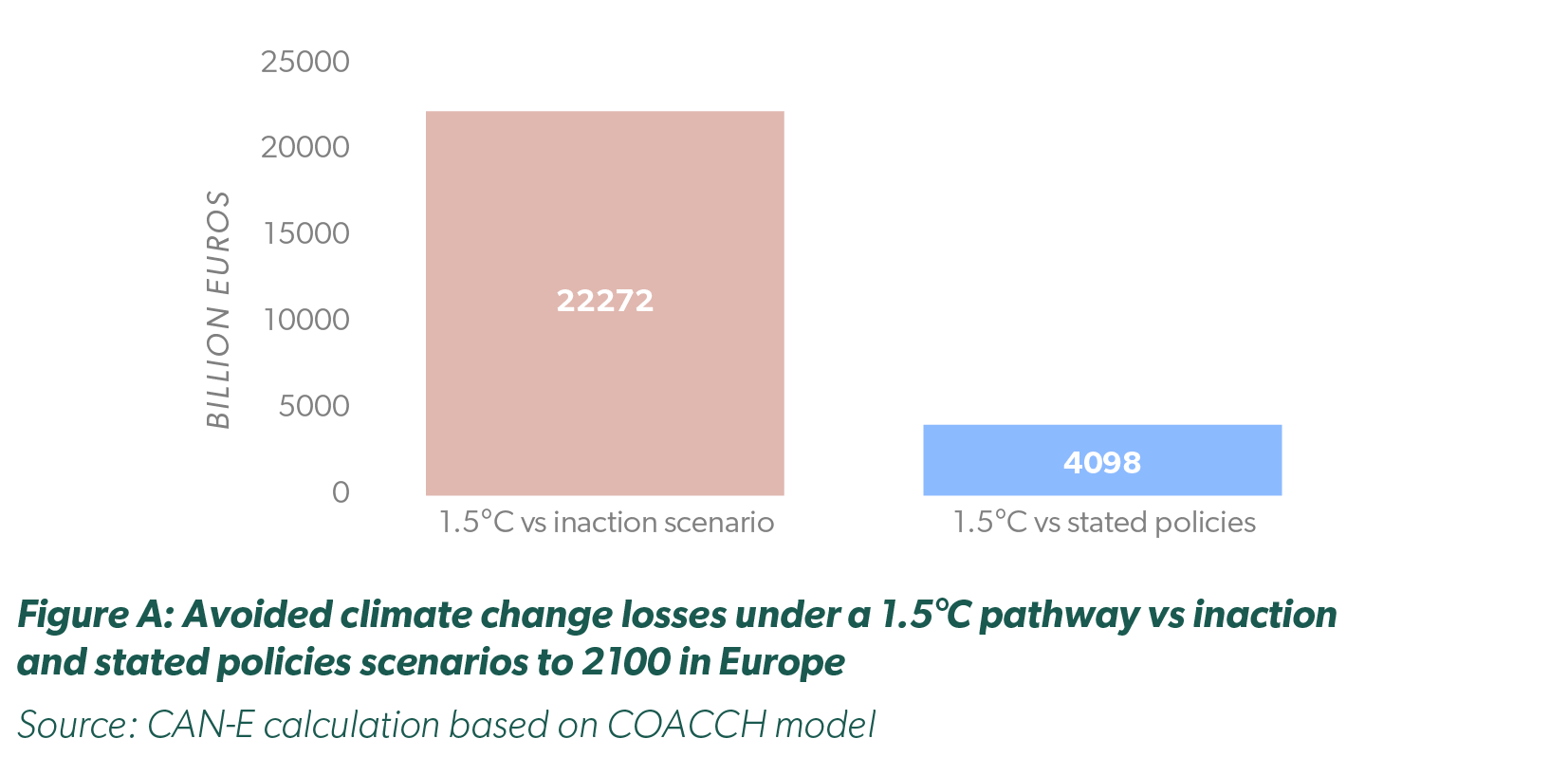
The figure A compares the difference in terms of avoided losses between the 1.5°C scenario against the inaction scenario and the moderate policies one. It shows that adopting a 1.5°C compatible pathway brings considerably less economic losses than any other less ambitious pathway. The EU stands to avert cumulative losses from now to 2100 of €22.2 trillions, versus inaction, or €4 trillions compared to the current policy scenarios. In terms of per capita figures, people in the EU would avoid a corresponding loss of 46,000 euros and 2,100 euros (by the end of the century) relative to the inaction and current policies scenarios respectively.
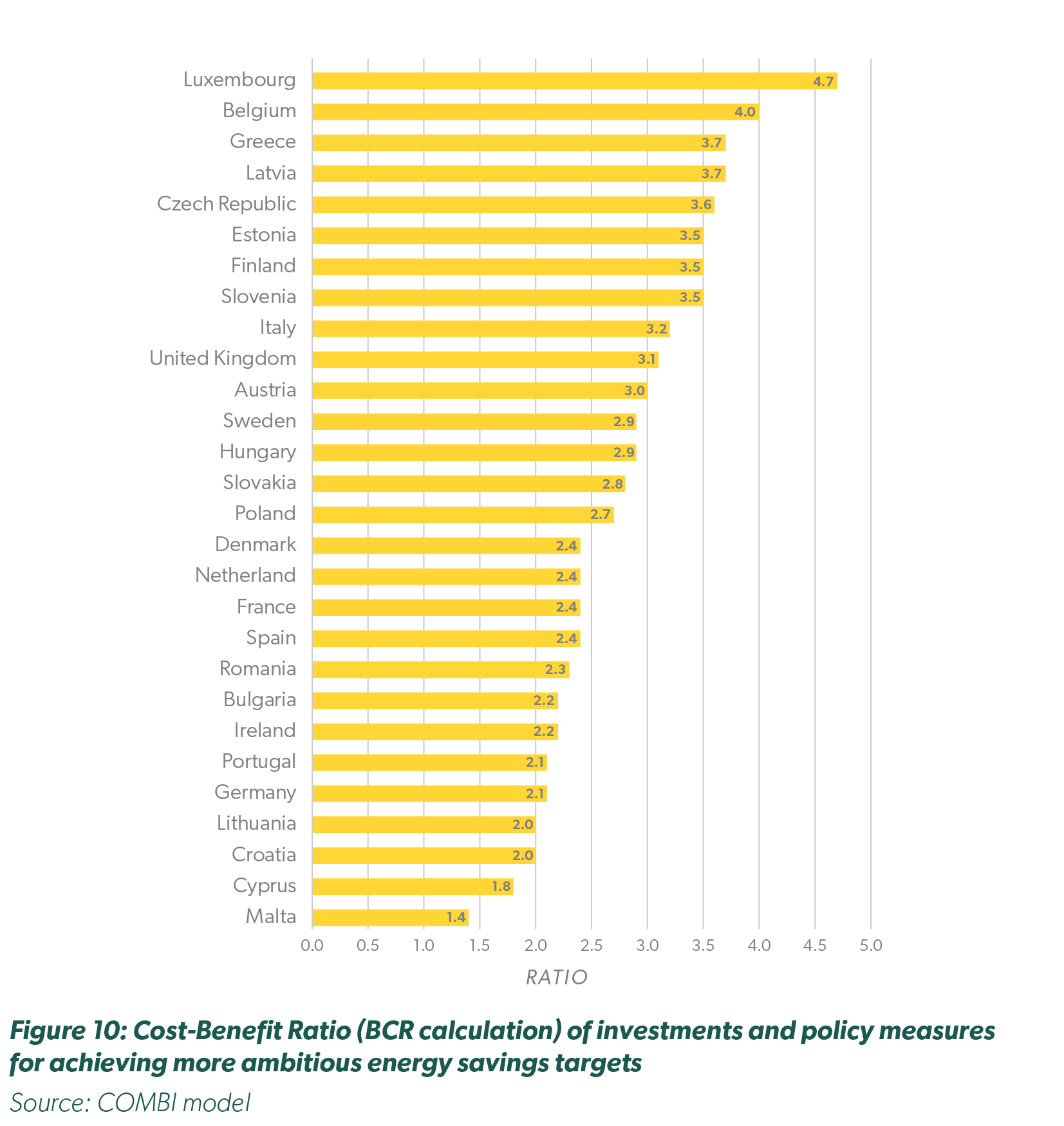
Benefits across Member States: a positive trend to unlock
The report also crunches data for a subset of 13 EU Member States: Belgium, Bulgaria, Czechia, Denmark, Croatia, Estonia, Slovenia, Germany, Hungary, France, Spain, Portugal, Poland.
Every national level calculation yields a favourable cost-benefit ratio, confirming that the pursuit of climate-neutral economies through a cost-effective implementation of a fully renewable energy system, coupled with the optimisation of energy efficiency and savings opportunities, outweighs investment costs. In other words each Euro invested in energy efficiency and energy savings measures would generate between 1.4 (Malta) and 4.7 Euros (Luxembourg) of co-benefits.
The largest economies logically experience higher co-benefits in absolute terms for a scale effect. In relative terms the expected co-benefits range from 2% of 2019 GDP (e.g. for Malta and Ireland) to more than 10% (Slovakia), with an EU average of approximately 6%. These results provide an unequivocal rationale for taking ambitious action even if taking into account co-benefits only.
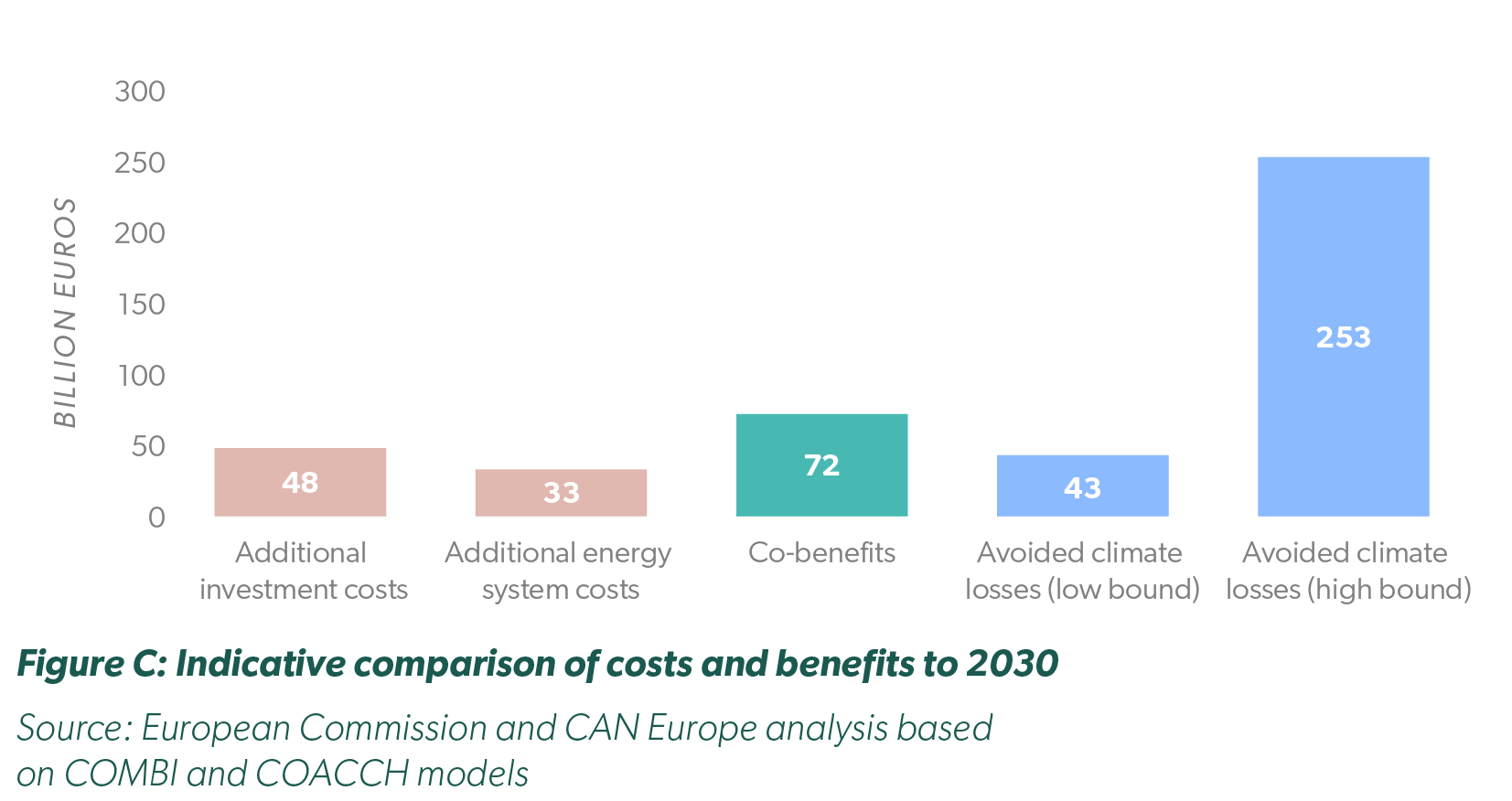
The benefits of climate action outweigh the costs
The costs of climate action reflect the sum of additional expenditures for achieving a full decarbonisation of the economy, including energy system expenditures and capital expenditures (investments). Those costs are measured as “additional” compared to a business-as-usual pathway, as it is evident that even without the energy transition there would be both energy system costs and investment costs associated with the energy system. Both the energy system and investment costs bundle together the expenditures of different economic actors, including the public sector, households and companies’ investments and expenditures, across different sectors.
In our calculations, we used the forecasted baseline (business-as-usual) investment and energy system costs to 2050 provided by the European Commission (European Commission (2020), Stepping up Europe’s 2030 climate ambition Investing in a climate-neutral future for the benefit of our people impact assessment) to estimate the additional costs that would be implied for implementing a 1.5°C compatible pathway.
Our indicative findings suggest that, for the EU as a whole, the benefits of ramping up climate action by implementing a 1.5°C-aligned pathway significantly outweigh the costs by a factor ranging between 1.4 and 4 to 1, illustrating an indisputable rationale for taking action.
New year, same priorities: accelerate climate action!
Based on all scientific evidence and the new findings of our report – we demand that decision makers prioritise, accelerated and bold climate action. An effective and unwavering implementation of climate and energy targets, aligned with a 1.5°C compatible pathway, is not just prudent but the only viable course. There is no cheaper, reliable, or more just alternative to climate action now.
These benefits are also showing that climate action is fundamental to pave the way towards a more resilient and just society, where future challenges, needs and the worst impacts on climate, society, biodiversity and ecosystems are cushioned thanks to a farsighted vision.
TERMINOLOGY
By co-benefits, we refer to all positive impacts related to climate mitigation measures, i.e. related to climate and energy policies, measures and actions on the economy. The positive impact on employment of a well-designed policy boosting renewable energy production would be such an example. Direct economic co-benefits could also comprehend ancillary impacts of climate action, including improving the productivity of resources and people (affected or not by climate change impacts), boosting innovation by seeking solutions amid new challenges, increasing the environmental benefits or improving ecosystem services.
By avoided losses, we refer to all the benefits related to avoiding the worst impacts of climate change and the related welfare losses. Climate change is already an expensive business for Europe even when accounting for a restrictive set of impacts: according to the EEA, welfare losses just from weather and climate-related extremes between 1980 and 2021 amounted to over half a trillion euros across the EU27.
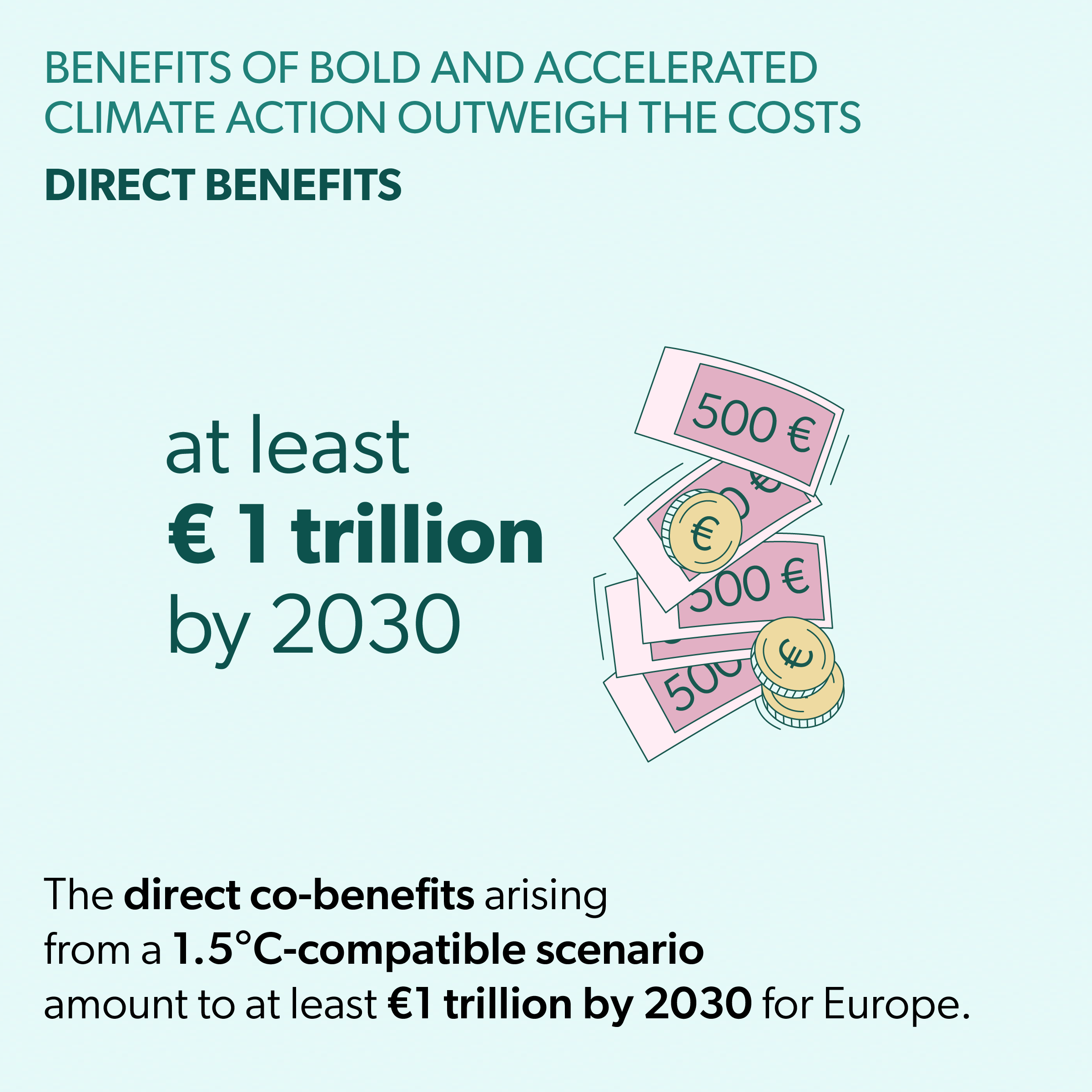
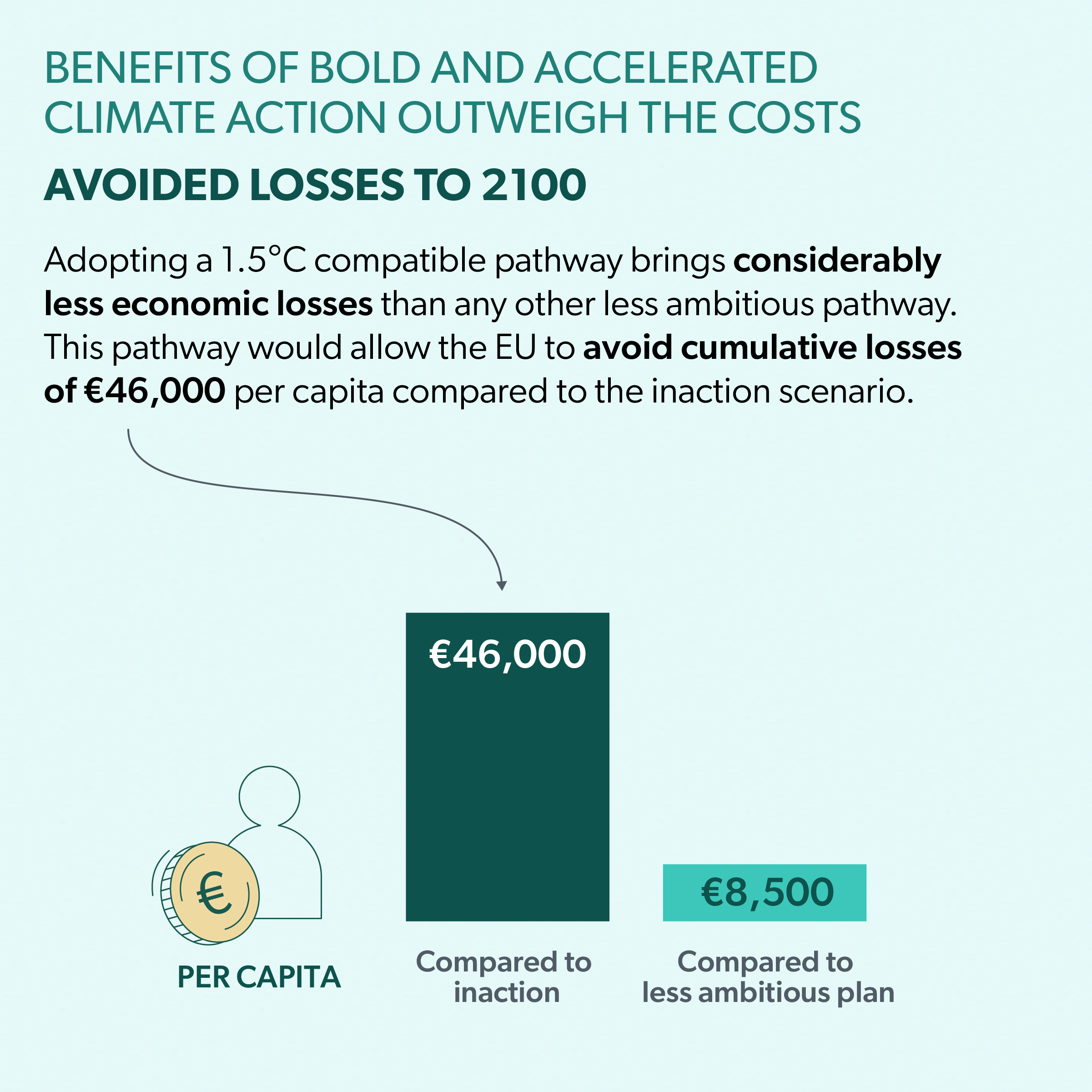
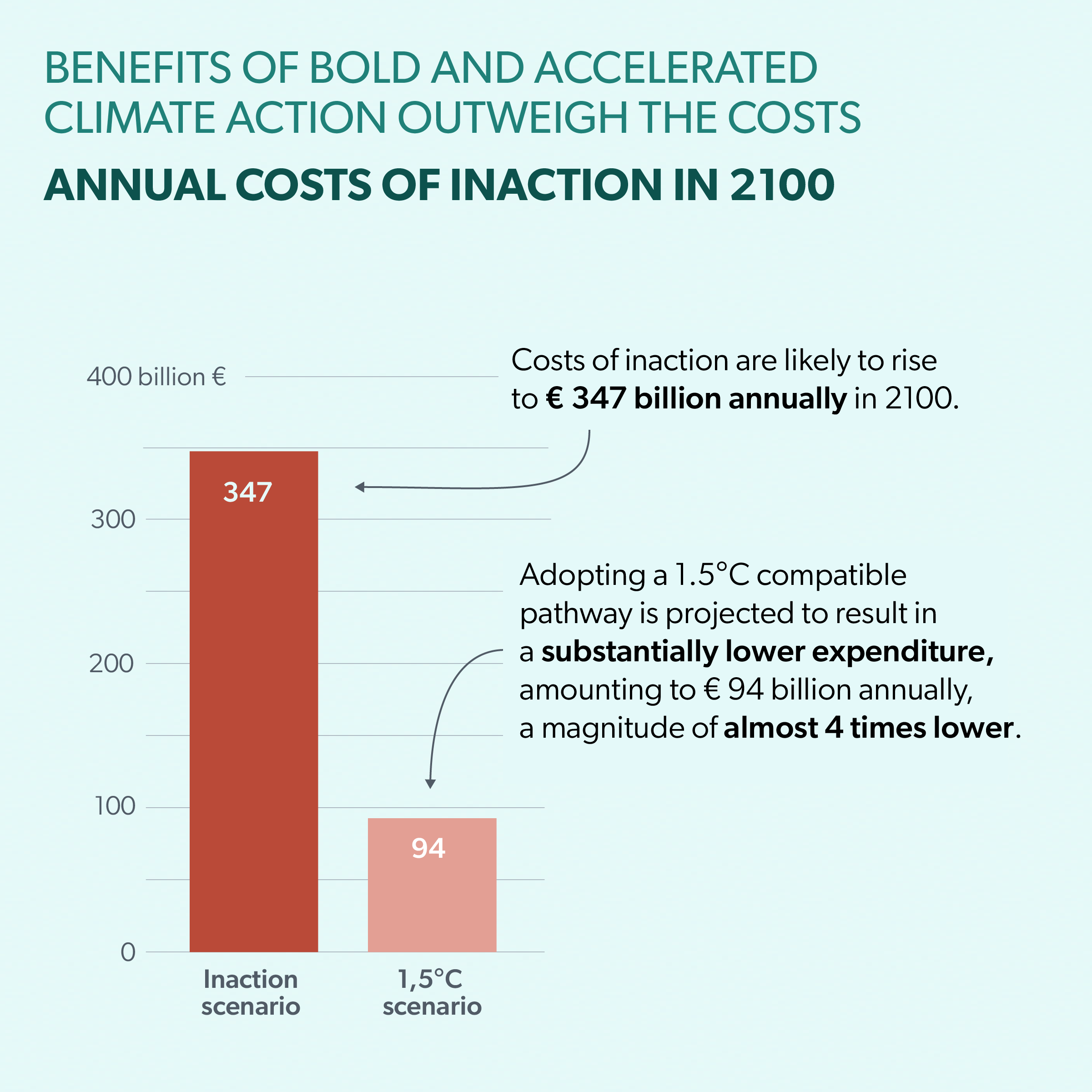
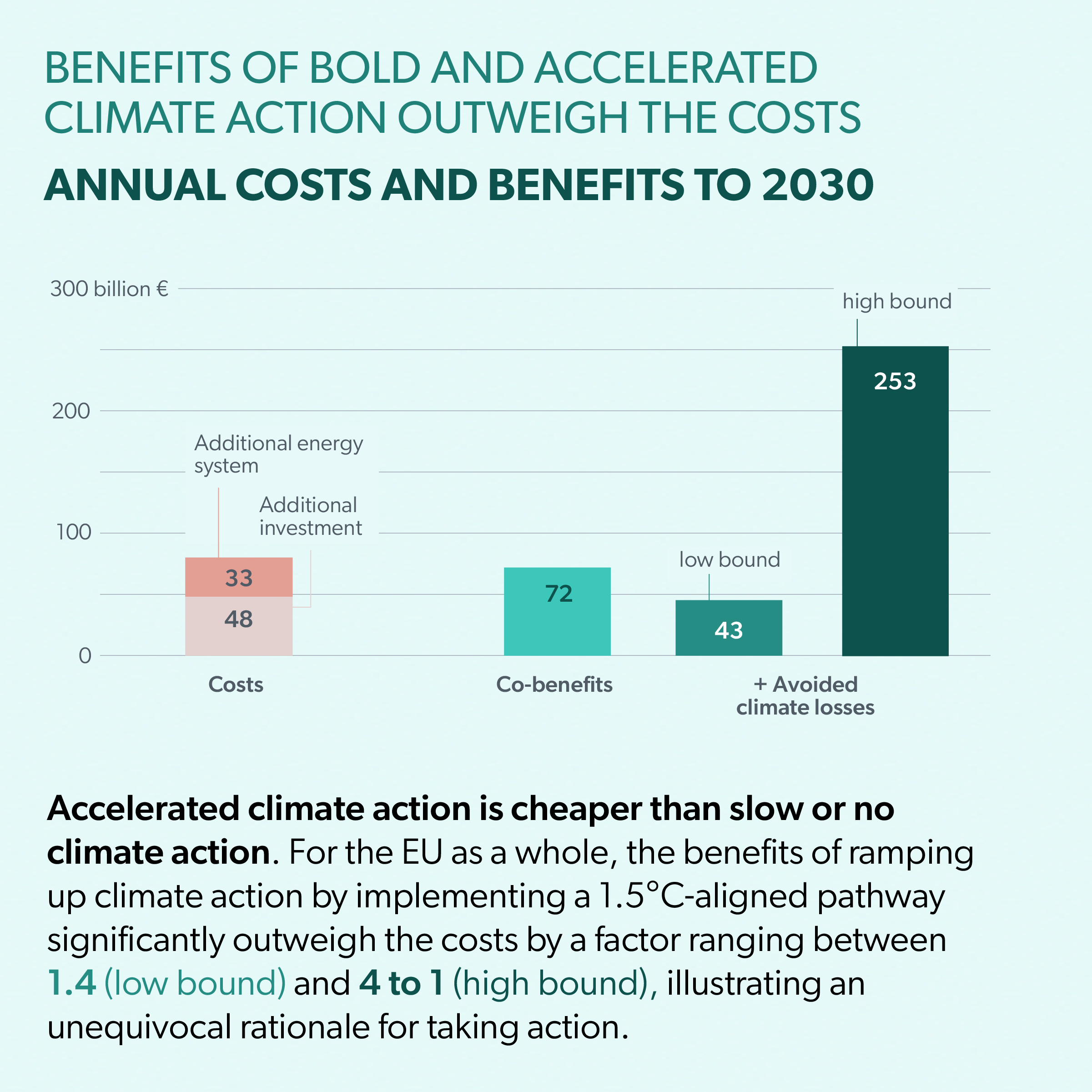
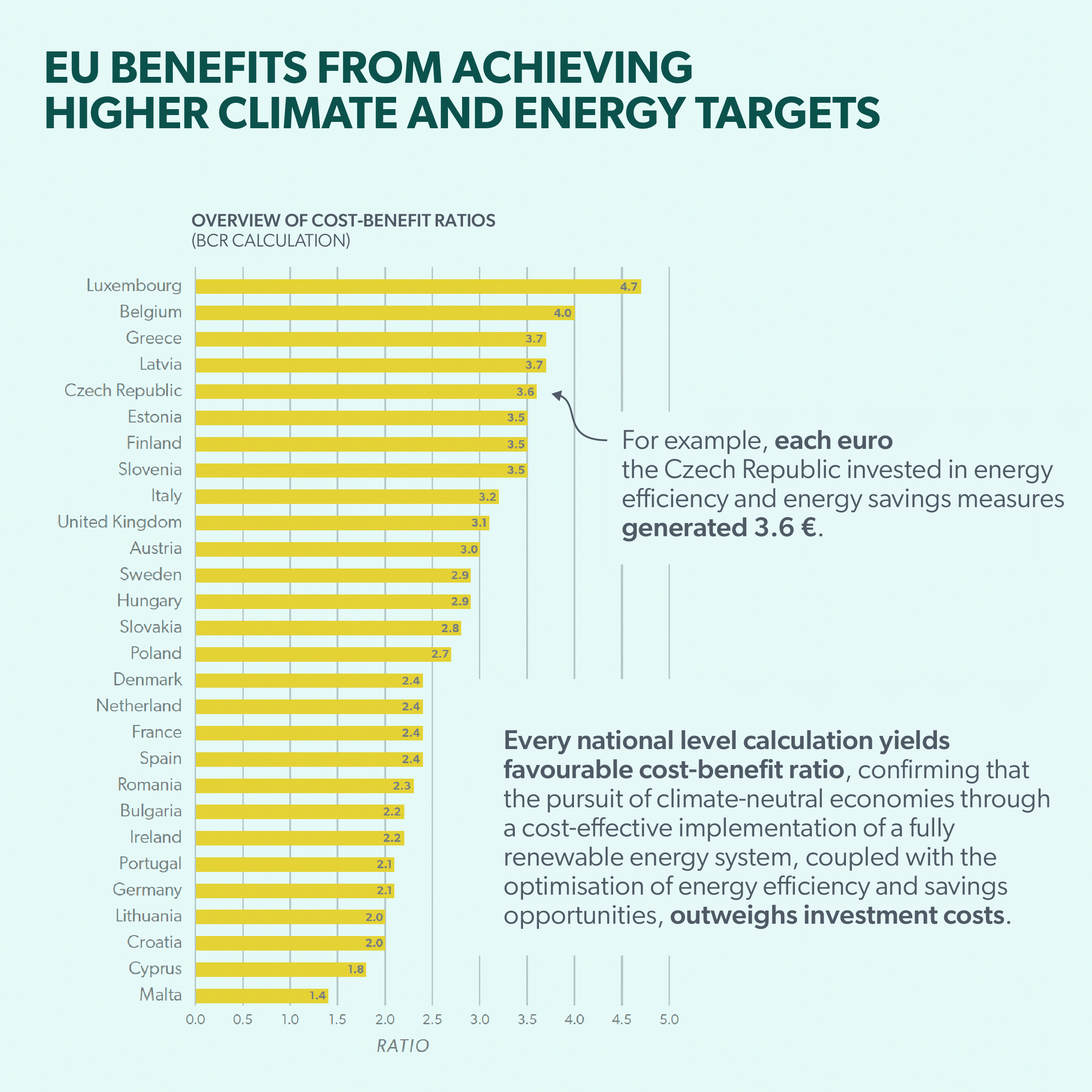
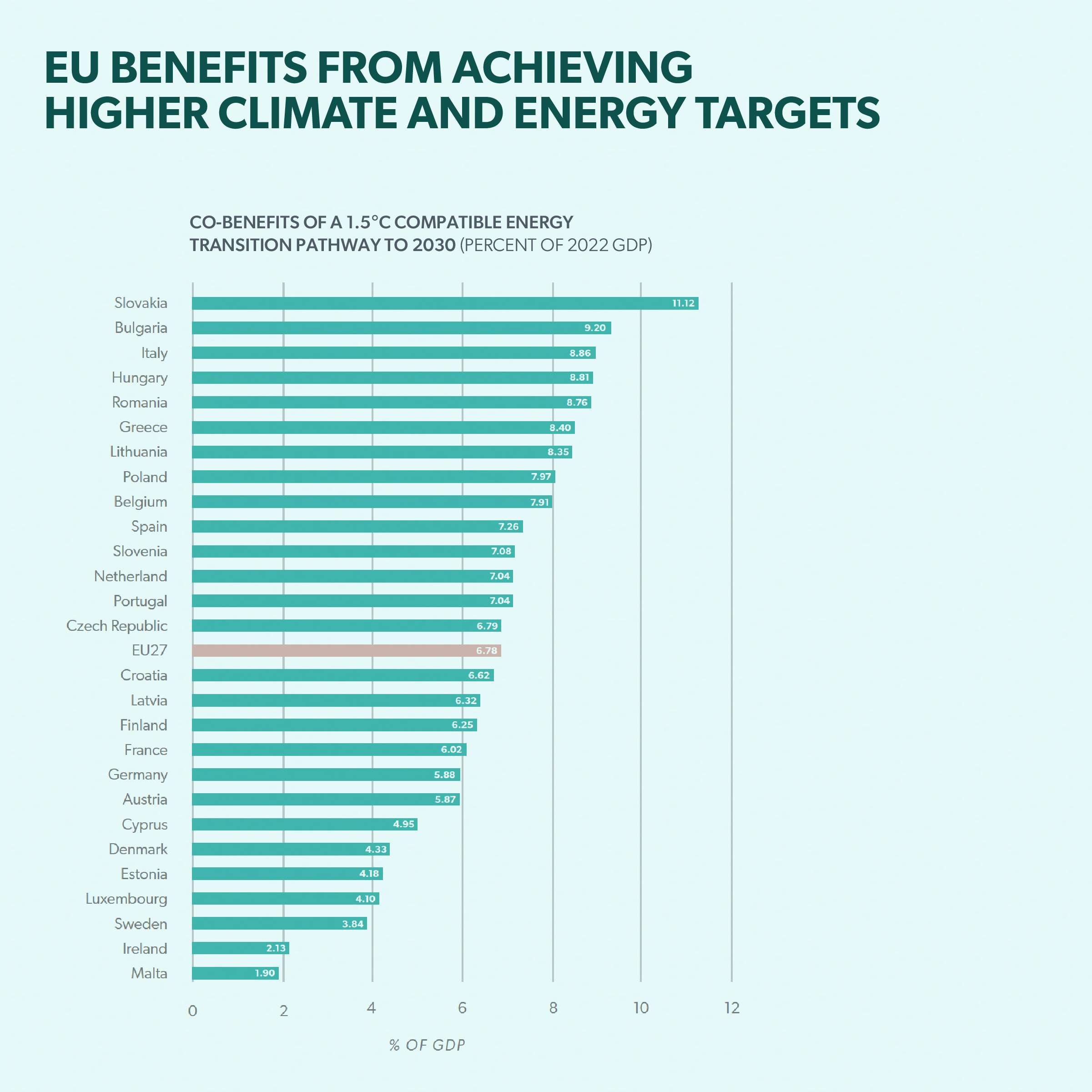
DOWNLOAD Paris Pact Payoff: Speeding up the green transition for socio-economic co-benefits”
PREVIOUS
NEXT

